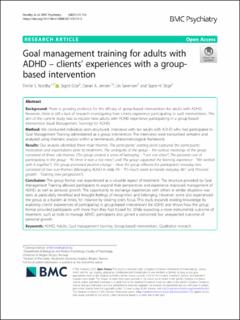Goal management training for adults with ADHD – clients’ experiences with a group-based intervention
Journal article, Peer reviewed
Published version

Åpne
Permanent lenke
https://hdl.handle.net/11250/2989325Utgivelsesdato
2021-02-19Metadata
Vis full innførselSamlinger
Sammendrag
Background: There is growing evidence for the efficacy of group-based interventions for adults with ADHD. However, there is still a lack of research investigating how clients experience participating in such interventions. The aim of the current study was to explore how adults with ADHD experience participating in a group-based intervention (Goal Management Training) for ADHD.
Method: We conducted individual, semi-structured, interviews with ten adults with ADHD who had participated in Goal Management Training administered as a group intervention. The interviews were transcribed verbatim and analyzed using thematic analysis within a hermeneutic phenomenological framework.
Results: Our analysis identified three main themes. The participants’ starting point captured the participants’ motivation and expectations prior to treatment. The ambiguity of the group – the various meanings of the group consisted of three sub-themes (The group created a sense of belonging - “I am not alone”; The personal cost of participating in the group - “At times it was a hot mess”; and The group supported the learning experience - “We worked with it together”). The group promoted positive change – How the group affected the participants’ everyday lives consisted of two sub-themes (Managing ADHD in daily life - “It’s much easier to handle everyday life”, and Personal growth - “Gaining new perspectives”).
Conclusion: The group format was experienced as a valuable aspect of treatment. The structure provided by Goal Management Training allowed participants to expand their perspectives and experience improved management of ADHD, as well as personal growth. The opportunity to exchange experiences with others in similar situations was seen as particularly beneficial and brought feelings of recognition and belonging. However, some also experienced the group as a burden at times, for instance by stealing one’s focus. This study expands existing knowledge by exploring clients’ experiences of participating in group-based interventions for ADHD and shows how the group format provided participants with more than they had hoped for. While expecting a more instrumental outcome of treatment, such as tools to manage ADHD, participants also gained a welcomed, but unexpected outcome of personal growth.
